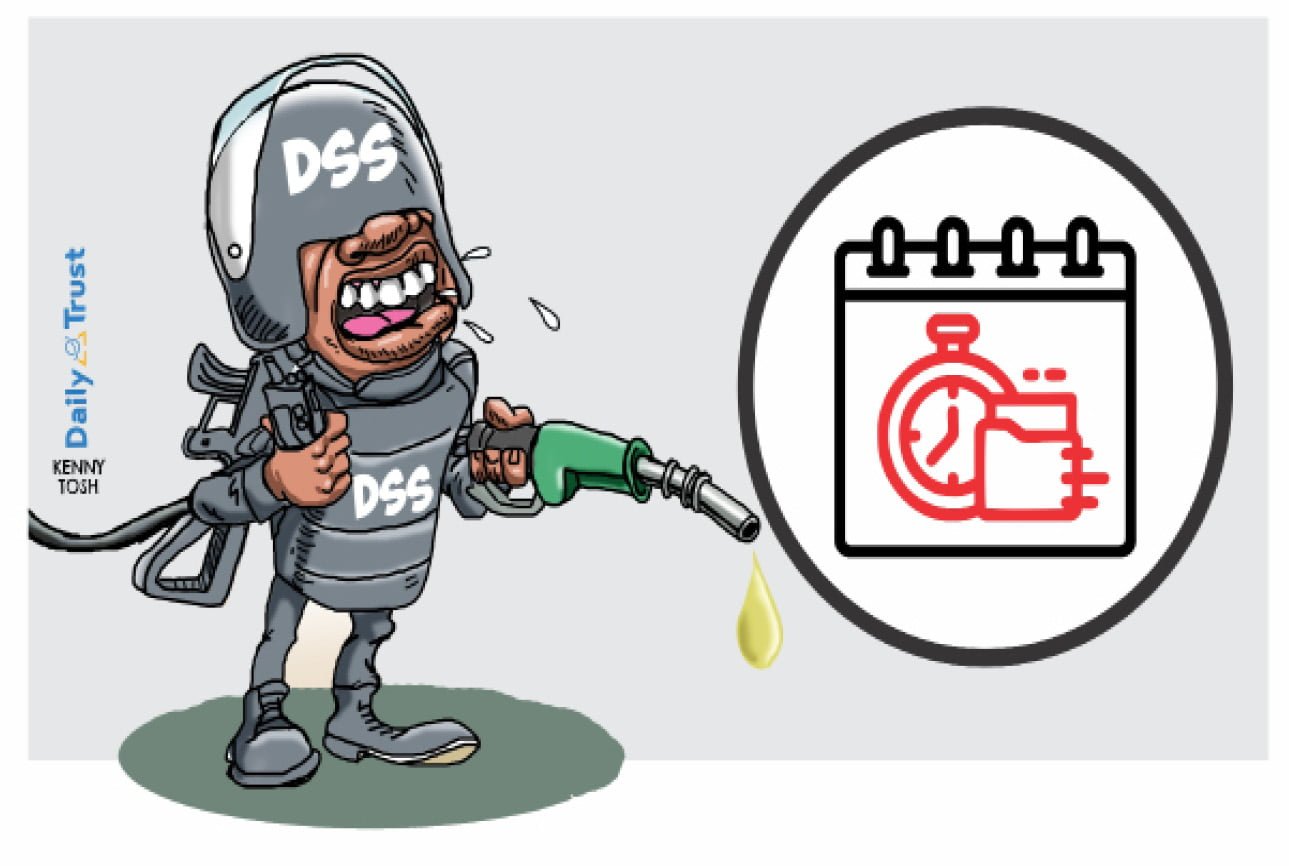[ad_1]
To differentiate between two elements that may be of the same family yet of varying characteristics, our elders in their native tongues have several wise sayings to illustrate such a case. We shall come to the place for this adage in the next few paragraphs. The Department of State Services (DSS), issued a 48-hour ultimatum on Thursday December 8, 2022 to the Nigerian National Petroleum Corporation Limited (NNPCL), the Independent Petroleum Marketers Association of Nigeria (IPMAN) and other stakeholders in the oil sector to end the lingering fuel crisis in the country. The secret service police, which vowed to go after the marketers if queues did not disappear within 48 hours also placed all DSS commands on red alert; with a promise to deal with defaulters.
DSS spokesman, Peter Afunanya, announced the ultimatum in Abuja while addressing reporters after the Director-General of the DSS, Yusuf Bichi, met with the stakeholders in the industry including officials of the NNPC Ltd, IPMAN, Major Oil Marketers Association of Nigeria (MOMAN) as well as Depot and Petroleum Marketers Association of Nigeria (DAPMAN). Others were officials of the Nigerian Association of Road Transport Owners (NARTO), Nigeria Union of Petroleum and Natural Gas Workers (NUPENG) and Petroleum Tanker Drivers (PTD).
Afunanya explained that the DSS’ intervention was to prevent any security breaches that could stem from the lingering petrol scarcity. He said the Service was being proactive to avert what could cause incitement in the country particularly during the Yuletide that was only few weeks far then. Responding to those who queried the involvement of the DSS in the fuel crisis, Afunanya said “We make bold to say that the Service is charged with the mandate of detecting and preventing crimes and criminalities that may want to jeopardize internal security of which this one is not an exception.
Interestingly though surprisingly, all the petrol queues in Abuja and Lagos disappeared in less than 24 hours after the well-timed threat by the DSS was declared to marketers. At least, three messages could be inferred from this swift response: (1) The DSS knows its onions; (2) The petrol scarcity was, after all, artificial; and (3) The worth of the DSS is not in doubt even on the minds of saboteurs and criminally-minded Nigerians. While there possibly exists a history of some lawbreakers daring law enforcement personnel, that chronicle is hardly heard of in the case of the DSS. Comparatively, this is the place for the Hausa metaphor “The track of the train is different from that of the car”. In their local tongue too, the native speakers of Nupe would say “The load carried on the head is heavier than that carried on the shoulder”. Qur’an 35:19-22 also remind us that the difference between the blind and the sighted, between the chilly shade and the blistering heat of the sun, and between the living and the dead; is very clear!
Nigerians, indeed, appreciate DSS’ intervention which quickly halted their travails in the hands of wicked petroleum marketers. But in case the DSS is not aware, the situation has refused to change outside of Abuja and Lagos. Petrol still sells for between N400 and N500/litre in many states. Nigerians are, therefore, appealing to the DSS to enforce the full wrath of its threat on marketers especially in towns and cities where the product is still being sold above official pump price. Nigerians really want to heave a sigh from buying petrol at extortionist and cut-throat prices.
Nigerian masses are also asking for more of such public-good threats from the DSS over questionable activities that seek to undermine their socio-economic wellbeing. This explains why Nigerians received with a lot of excitement the threat issued by the DSS on Thursday December 15, 2022 against undue price hikes, artificial scarcity of products and other situations capable of heightening tensions in the country. The warning directed at politicians against fake news, hate speech, violence and other acts inimical to national security was also apt.
Mr. Afunanya is hereby urged to advise Oga Yusuf Bichi to ignore the comments of ‘bad-belly’ Nigerians who are accusing the DSS of operating outside of its mandate. Yes, even if the threats were taken for granted to be outside of its jurisdiction, the DSS isn’t the first to do that. Where were those nit-picking Nigerians when the military was drafted, at the heat of insurgency, to mount and man road-blocks in order to restore civil order and peace; an assignment outside of their professional duties? That is strictly the job of the police. The military is trained to kill in war-torn situations. Where, also, were those Nigerians when the Independent National Electoral Commission (INEC) started using university professors as Returning Officers in general elections? Libraries, classrooms and laboratories are the main constituencies of professors. Yet, no one objected to sending them to polling units or INEC offices because of the collective desire for credible elections.
Nigerians earnestly want the DSS to carry its earlier threats further to, for instance, commodity marketers in order to tackle inflation believed to have been orchestrated by artificial market forces. Inflation is increasingly making life difficult for Nigerians, crippling small businesses, affecting the health of many and worsening the condition of the already-ill. The DSS should also read riot act to the communication industry where subscribers of GSM networks continue to suffer from frustrations unleashed by service providers through poor connectivity. The regulatory agency, the NCC, should not be spared if found to have compromised its functions. The DSS should equally go after politicians that are reportedly buying PVCs from voters. In fact, the DSS is encouraged to continue to intervene with necessary threats whenever and wherever such interventions would provide workable solutions to challenges confronting the Nigerian public. May Allah guide the DSS to serve and protect Nigerians without circumventing national security and interest, amin.
[ad_2]
Source link



